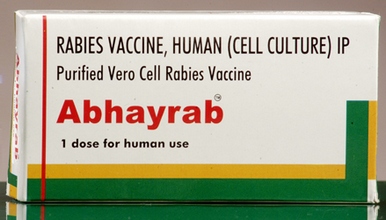Rabies vaccine – Autovaccines
What is infuriating?
Rabies – infection, caused by a virus. Infection is almost always fatal, if treatment is not started before the onset of symptoms. The rabies virus affects the central nervous system.
People usually become infected with rabies through the bite or scratch from an infected animal. In wild animals carry the virus are most often bats, enotы, foxes. Dogs, cats and other pets can also be vectors of disease. Rabies virus is contained in the saliva of, brain or nerve tissue of infected animals.
Symptoms of rabies include:
- Pain, tingling, or itching at the site of the bite or other place of penetration of the virus in the body;
- Numbness Muscle;
- Increased production of saliva;
- Flu-like symptoms, such as headache, fever, weakness, and nausea;
- Painful spasms and reduced throat when in contact with water;
- Instability, excitement or strange behavior;
- Paralysis.
Symptoms may not appear for weeks, or even years after a bite.
If an animal has bitten you, You must immediately rinse the wound with SOAP and water. Is immediately sent to the hospital.
What is rabies vaccine?
The vaccine produced from killed rabies virus. It is administered by injection.

Who and when to be vaccinated against rabies?
There are two methods of vaccination against rabies:
- Preventive vaccination;
- Vaccination after exposure to a possible carrier of the virus.
Preventive vaccination against rabies
It is used for people with a high risk of exposure to rabies:
- Veterinarians and animal trainers;
- Workers in the laboratory, where there is the likelihood of rabies virus;
- People, who explore caves;
- Person, that may come in contact with rabid animals.
The vaccine is administered in three doses. The second dose is administered within seven days after the first dose, third immunization performed via 21 or 28 days after the first. Individuals, which may be re-exposed to the virus, It should be periodically tested for immunity. May need additional vaccinations.
Vaccination after exposure to rabid animals
Held persons, who have been bitten by an animal or otherwise been exposed to rabies virus. Includes 4-5 doses of rabies vaccine. The first dose is administered at once, and four third dose, seventh, fourteenth, twenty-eighth day. Besides, together with the first dose of rabies immunoglobulin is administered specific. For individuals, who were previously vaccinated, require two vaccine doses. One dose is given right away, the second on the third day. If you have previously carried out a preventive vaccination against rabies, antirabicheskij-specific immunoglobulin is not required.
Risks, associated with vaccine against rabies
As with any vaccine, rabies vaccine can cause serious problems, such as heavy allergic reactions. Risk of serious injury or death is extremely small.
The most common problems are:
- Soreness, redness, swelling or itching at the injection site;
- Headache;
- Nausea;
- Abdominal pain;
- Muscle aches;
- Dizziness;
- Hives;
- Pain in the joints;
- Fever.
In rare cases, complications remind Guillain Barre syndrome and other diseases of the nervous system.
Who should not be vaccinated against rabies?
Ask your doctor about the need for vaccination in the following cases:
- It was a life-threatening allergic reaction to a previous dose of rabies vaccine or one of its components;
- In connection with disease, use of drugs or the immune system is weakened by cancer;
- Moderate or severe illness. Prophylactic vaccination should be carried out after recovery. When possible infection with rabies, vaccination is necessary to carry out immediately.
What are some ways to prevent rabies vaccination in addition?
There are several ways to prevent rabies:
- Vaccination of domestic animals;
- Avoid contact with wild animals;
- Do not touch any wild animal, even if it seems to be dead;
- Close basement, entrance and openings in the attic. This will prevent the animals in the house;
- Provide health authorities about the strange behavior or sick animals.
Symptoms of rabies in animals may include:
- Strange behavior (often overly aggressive);
- Disorientation (eg, nocturnal animals, such, bats and foxes, hunting in the daytime).
What happens in the event of an outbreak of rabies?
In the event of an outbreak the health authorities should identify and suppress the source of rabies. They will strengthen the monitoring of wild and domestic animals. Steps will be taken to vaccinate pets against rabies and to ensure the safety and education of the population.
